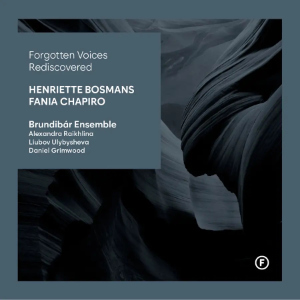
Forgotten Voices Rediscovered
Henriëtte Bosmans (1895-1952)
Sonata for Violin and Piano (1918)
Piano Trio (1921)
Fania Chapiro (1926-1994)
Sonata for Cello and Piano (1956)
Brundibár Ensemble
rec. 2022, Menuhin Hall, Yehudi Menuhin School, Cobham, UK
Fineline FL72416 [67]
It’s interesting to read how this recording came about. It begins with the Brundibár Arts Festival, so named after Hans Krása’s children’s opera Brundibár. The Festival “showcases the little known music written during the Holocaust”. From this event, the Brundibár Ensemble started life. One of the themes of the 2022 Festival was “Inspirational Women”. This disc spotlights two Jewish-Dutch composers, both of whom survived the Holocaust.
In addition to being a composer, Henriëtte Bosmans was a celebrated pianist. She was nurtured in a musical environment with both parents being musical. Her father was a solo cellist with the Concertgebouw Orchestra, her mother, an accomplished pianist, gave her daughter her first piano lessons. She eventually took composition and orchestration lessons, with Willem Pijper being one of her teachers from 1927 to 1930. In 1941 she was banned by the Nazis from performing because she was half-Jewish and because she refused to become a member of the Kulturkammer. After a fallow period she resumed composing after the War. She died of stomach cancer in 1952. Her music was considered modern for its time, being inspired by such composers as Debussy. It was Willem Pijper who drew her towards polytonality.
The romantically-infused Sonata for Violin and Piano dates from 1918 and remained unpublished until 2021. Cast in four movements, the first is the most substantial at just over 13 minutes. This opener is charged with youthful exuberance and fervour, yet there are sections when the music becomes more musing and wistful. A sprightly scherzo-like movement follows, very light on its feet. The Adagio is dark, doleful and dispirited. This mournful demeanour is carried forward into the finale, which employs elements of fugal writing.
Three years later in 1921, Bosmans wrote her three-movement Piano Trio and presented it as a birthday gift to her mother. It was another seventeen years before it received a premiere in 1938, with two members of the Concertgebouw orchestra and the composer on piano. The opener is ebullient, with a hint of tenacity and resolve. Then comes an Andante Moderato, hushed with mysterious undercurrents. Bosman ratchets up the tempo halfway through with a buoyant theme decorated with flourishes on the piano. Then the music dies down as it began, tapering away to almost nothing. After an Andante introduction, the final movement opens out into a spirited dance of foot-tapping geniality.
Fania Chapiro hailed from the island of Java, Indonesia (the former Dutch East Indies). Her father was Russian, her mother Dutch. She revealed an exceptional musical talent early on. She eventually became a composer and an accomplished pianist. On one of their frequent journeys to the Netherlands, the family became stranded there when war broke out in 1939. Being half-Jewish, Fania was prohibited from performing, and this resulted in her organizing several clandestine house concerts. The family house was eventually burnt down, and many of her musical scores were lost. After the War the family moved to New York, and Fania resumed her career as a pianist. She also did some teaching. In 1953 she returned to Europe and died in Hilversum in 1994.
The notes inform us that this is Fania Chapiro’s Second Cello Sonata from 1956. Cast in four movements, it’s heavily influenced throughout by Prokofiev, especially in the brutal thrusts of the first movement. The percussive elements spill forth into the Scherzo which follows, but there are also moments of fickle edginess. It’s the third movement that sounds the most like Prokofiev to me; one imagines that it could have come directly from his pen. The finale is both jazzy and sassy and sets a satisfying seal of this attractive work.
The two Bosman works have appeared on CD before on the Toccata label (review). This release was reviewed by my colleague Jonathan Woolf last year, and he was far from enamoured with it, citing the unsympathetic acoustic amongst other things. You will be pleased to know that there are no such issues here. These are beautifully recorded performances and are deserving of the highest praise. The Brundibár Ensemble perform with dedication and commitment and are persuasive advocates for these charming scores.
Stephen Greenbank
Help us financially by purchasing from



Brundibár Ensemble
Alexandra Raikhlina (violin)
Liubov Ulybysheva (cello)
Daniel Grimwood (piano)

















